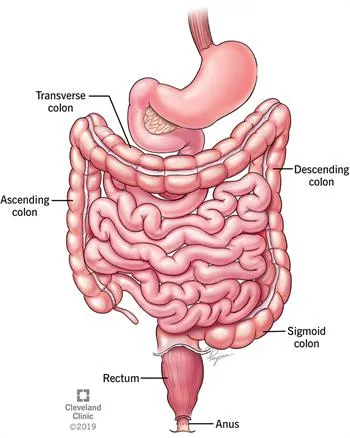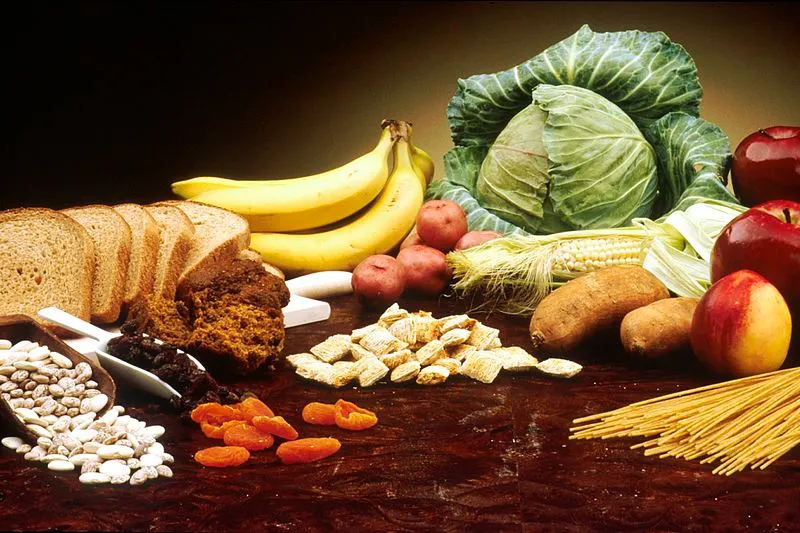
Image Source
Uness you’ve been living under a rock, you’ve heard that fiber can keep you from getting blocked up. Even if you have heard that advice, though, you might be wondering just how much fiber your diet should include and which specific types of food add the most fiber. In general, to prevent and relieve constipation, nutrition experts recommend eating more high-fiber foods such as fruits, vegetables and whole grains. Even if your diet is rich in these foods already, it’s possible that you are not getting enough of one type of fiber or another. If your bowel movements are less than once per day or painful to pass—or if they never occur at all on a regular basis—beefing up your fiber intake may help. Practicing good habits like drinking plenty of water and going to the bathroom when you feel the first inklings of needing to go will also ease constipation and its accompanying discomfort.
What Is Fiber?

Fiber is a type of carbohydrate found in plant foods that isn’t broken down in the digestive system. Insoluble fiber promotes healthy digestion by helping food move smoothly through the large intestine and out of the body. It also helps prevent constipation by increasing the amount of water in the stool. The more water in the stool, the softer it will be. A high-fiber diet also helps lower blood cholesterol by preventing reabsorption of cholesterol that has been excreted in the bile. One common way to measure fiber intake is to count grams per day. The Institute of Medicine recommends adults consume between 21 and 38 grams of fiber per day. Fiber’s health benefits go beyond just preventing constipation. Studies have shown that people who consume more fiber have a lower risk of developing heart disease and type 2 diabetes. A high-fiber diet may also reduce the risk of colorectal cancer.
Soluble vs. insoluble fiber
There are two main types of fiber: soluble and insoluble. Soluble fiber dissolves in water and is found in foods such as oats, beans, apples and citrus fruits. It lowers cholesterol and may also help control blood sugar. Soluble fiber is often added to foods like cereal or baked goods to improve texture and reduce calories. Insoluble fiber does not dissolve in water and is primarily found in vegetables. It helps food move through the digestive tract and may reduce the risk of colorectal cancer. Consuming both types of fiber can have benefits beyond just preventing constipation.
Which Foods Are High in Fiber?
As we mentioned above, fiber is primarily found in plant foods such as vegetables, fruits, beans, nuts and whole grains. A high-fiber diet may also reduce the risk of heart disease, type 2 diabetes and colorectal cancer. Some foods that are particularly high in fiber include the following: - Black beans: 15.5 grams - Lentils: 10.8 grams - Oatmeal: 6.3 grams - Apples: 5.6 grams - Raspberries: 8.4 grams - Brown rice: 3.4 grams - Barley: 7 grams - Almonds: 6.3 grams - Peas: 7.6 grams
Reference
Constipation Causes and Contributing Factors

Source
Before you start treating your constipation with fiber supplements or a high-fiber diet, it’s helpful to know what can cause constipation in the first place. Most people experience constipation from time to-time, so if you’ve been having a few less-than-pleasant bathroom experiences, don’t worry. Even if you generally experience easy bowel movements, you can experience constipation. The most common causes of constipation include not drinking enough water, eating a diet low in fiber, certain medications, changes in diet or exercise patterns, pregnancy and certain medical conditions. If you have been constipated for a while, your doctor may recommend adding fiber to your diet.
Ways to Prevent Constipation and Keep Your Colon Healthy
It is perfectly normal for your body to go through occasional phases of decreased regularity. However, prolonged constipation can have adverse effects on your overall health. The colon is the third and final chamber of the human digestive tract, and it plays an important role in our bodies. Colon also known as the large intestine is responsible for further breaking down food and absorbing nutrients before excretion. If you are reading this article, it means you probably have a friend or family member who has been dealing with constipation. If you know someone who struggles with it on a regular basis, let them know they aren’t alone! The good news is that there are many ways to prevent constipation and keep your colon healthy at the same time. Here are 14 simple tips that may help:
How to prevent constipation?
The first step towards preventing constipation is to eat a healthy and balanced diet. Remember that constipation is not a disease in itself, but rather a symptom of another health problem. If you are dealing with constipation, it is important to make healthy lifestyle changes to prevent it from becoming a long-term problem. You should aim for daily intake of 25-30 grams of fiber to prevent constipation. Your daily fiber intake should come from whole grains, legumes, fruits and vegetables.
Eat more fiber
Fiber is an essential part of a healthy diet that can help prevent and treat constipation. At least 25 grams of fiber should be consumed daily to maintain optimal digestive health. This will also aid in controlling blood sugar levels, reduce cholesterol and help prevent type 2 diabetes and heart disease. Bread and cereals are often fortified with fiber (check the label!), but otherwise fruits, vegetables, and legumes are your best options for increasing your daily fiber intake. Some examples are whole grain bread, oatmeal, fruits like apples and prunes, beans, or dark leafy greens.
Drink more water
Water is a crucial part of any healthy diet. It helps you with almost every bodily function. To prevent constipation, make sure to drink at least 8 glasses of water per day. Drinking enough water will also help to prevent bloating, gas, and cramps.
Move your body
Exercising regularly can do wonders for your digestive health. It can help to keep your bowels healthy and improve your bowel movements. Exercise can also be beneficial for your mental health. Many people with constipation also experience anxiety or depression. Regular physical activity has been shown to reduce feelings of anxiety and depression. Exercising regularly will also help you to maintain a healthy weight. If you are overweight, the extra weight can put pressure on your digestive organs, causing constipation.
Try pranayama and yoga breathing exercises
Certain breathing exercises are helpful for constipation. Pranayama, or yogic breathing, has been shown to help with constipation. Yoga asanas, or poses, have also been shown to help with constipation.
Do not ignore the problem
If the above steps do not help with your constipation, you should make sure to talk to your doctor. You can also consider gentle bowel cleansing with essential oils. In some cases, constipation can be a symptom of a more serious condition. If this is the case, it is important to see a doctor as soon as possible.
Take a probiotic supplement
Probiotics are beneficial bacteria that can be found in various foods and supplements. Probiotics are also thought to benefit people with constipation. There are many probiotic supplements on the market. Choose a product that contains the Lactobacillus or Bifidobacteria strains.
Use essential oils for gentle bowel cleansing
Some essential oils have anti-inflammatory and anti-oxidant properties that can be beneficial for those with constipation. These include the following essential oils: - Black Pepper: This essential oil has anti-inflammatory and anti-oxidant properties. It has been shown to help with gas, bloating, and cramps. - Chamomile: Chamomile has anti-inflammatory properties. It has been shown to reduce feelings of anxiety and depression. - Roman Chamomile: This has anti-inflammatory properties and has been shown to help with constipation.
Reference
If these don’t work, see a doctor immediately!
If the above steps do not help with your constipation, it is important to see a doctor. It may be due to an underlying health condition. Depending on the severity, the doctor may prescribe you with laxatives or recommend other treatment options. Even if you are experiencing mild constipation, it is important to be aware of the potential health issues that can arise from it. The health of your colon plays an important role in your overall health, so it is important to take preventative measures to keep it healthy. The above tips can help with preventing constipation, so remember to implement them in your daily life.
How to Treat Constipation: What Works and What Doesn’t
If you’re experiencing constipation and want to try to treat it naturally with diet changes, the first thing you should do is look at the amount of fiber in your diet. Ideally, you should be getting at least 25 grams of fiber per day. However, if your diet is high in fiber but you’re still having issues going number two, try upping that number. Eating high-fiber foods like beans, whole grains and fruits is a good start, but you may also want to consider taking a daily fiber supplement. If you’ve been trying to add fiber to your diet for a few weeks without success, it’s also possible that something else is causing your constipation. Take note of how often you go to the bathroom, and if you’re going less often than you used to, you may want to see a doctor. If your constipation has been lasting for more than a few weeks, you may want to consider seeing a doctor.
Bottom line
Fiber is an essential part of a healthy diet, and it’s particularly important for people who have issues with constipation. Before you start treating your constipation with fiber supplements or a high-fiber diet, it’s important to know what can cause constipation in the first place. Eating foods that are high in fiber is a great way to prevent and treat constipation naturally.
Reference:
https://en.m.wikipedia.org/wiki/Dietary_fiber
https://www.benefiber.com/fiber-in-your-life/daily-fiber-intake/top-10-high-fiber-foods/
https://www.medicalnewstoday.com/articles/318694#_noHeaderPrefixedContent
https://my.clevelandclinic.org/health/diseases/4059-constipation
https://www.verywellhealth.com/constipation-causes-1944788

It's my pleasure to introduce myself. I'm SHEIKH from Bangladesh.Recently I have passed my semester final Deploma in Textile and Now I want to BSC a private university.I wish that I study together with the job.Textile and Garments job is so hard that is not possible to continue study and job so i want to do something on online. That why i am come here.I have a 6 members in my family. I have a. Two brothers and one sister and also parents.My father is a business man. My mother is a housewife and brother are doing job and sisters studying.
My favorite game football but till a long time I can't play it because I don't get time to play and also my health condition is not good.
My favorite Food Biryani and Meat and Khichuri.I like Jhal very much.My favorite Colors are Black and White.
My favorite activity is Photography, Crypto, English learning, Content Writing.......